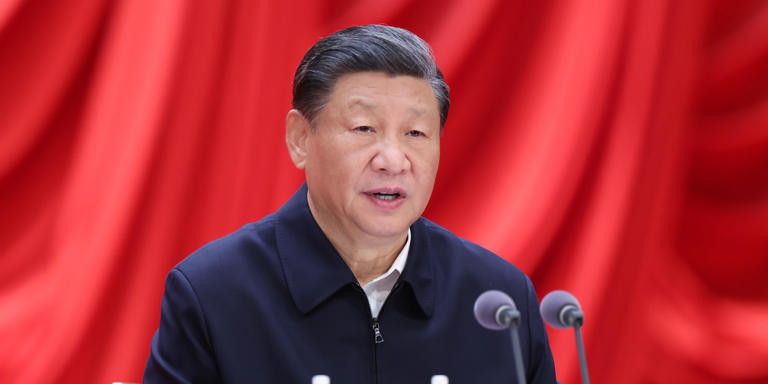China’s recent New Year celebrations provided a temporary reprieve for its citizens, offering both mental and economic relief amidst the ongoing economic challenges facing the nation. The extended holiday period, one day longer this year due to it being a leap year, saw significant activity, with 474 million trips made and 163 million movie tickets sold across the country.
However, as the festivities fade into memory, Beijing finds itself confronted once again by the harsh reality of its economic struggles. The political leadership of the authoritarian regime is grappling with these challenges as the National People’s Congress convenes in the capital city of Beijing.
No new construction projects are being realized
The ongoing real estate crisis in China presents a significant challenge to the Communist Party, with industry giants like Evergrande and Country Garden facing liquidation orders. Chinese citizens heavily invest in real estate, with approximately 70 percent of their investments allocated to this sector, twice the amount seen in the United States.
The cessation of new construction projects not only impacts the housing market but also deprives provinces of a crucial revenue source derived from land sales. Consequently, tens of thousands of individuals who have already purchased apartments now find themselves grappling with unfinished buildings, exacerbating the crisis.
This situation poses a considerable dilemma for Xi Jinping and his inner circle. Despite the gravity of the issues at hand, the National People’s Congress operates differently from a democratic parliament. Decisions are essentially rubber-stamped by delegates chosen for their loyalty to the Communist Party and their positions within it. These decisions are often predetermined by a small circle around Xi Jinping well before the congress convenes, limiting the scope for open debate and meaningful reform.
Xi sidelines his Prime Minister Li Qiang
Xi Jinping’s utilization of major events like the current National People’s Congress to showcase his unchallenged power is evident. In October 2022, he orchestrated the public escort of his predecessor, Hu Jintao, out of the Great Hall of the People during the 20th Party Congress, a move that served as a humiliation for Hu and his moderate faction, which found no place in Xi’s newly formed inner circle.
In a similar vein, this year, Xi has marginalized his Prime Minister, Li Qiang. Traditionally, the Prime Minister delivers the first speech at the National People’s Congress, focusing on economic development. However, this year, there will be no press conference with the Prime Minister following the ceremony, where he could set or explain his own agenda. This breaks from past practice where Li’s predecessor, the late Li Keqiang, used such opportunities to differentiate himself from Xi Jinping on economic matters.
Whether Li Qiang, who is widely viewed as extremely loyal to Xi, made this decision independently or under Xi’s direction remains unclear. However, both scenarios are plausible given the current political climate in China.
Official numbers are whitewashed according to experts
The cancellation of the press conference with the Prime Minister indeed deprives the international community of one of the few insights into the inner workings of the Communist Party and its decision-making process, especially concerning economic matters—a crucial need amid the ongoing economic crisis in China.
Official economic figures released by the People’s Republic are often met with skepticism from experts, who believe they are whitewashed. For example, Foreign Policy reported that China’s economic growth in 2023 may have been significantly lower than the stated 5.2 percent, possibly around 1.5 percent. The cancellation of the press conference appears to lend credence to the theory that the leadership operates with inflated numbers, which would likely have been scrutinized by international media during the conference.
Despite the National People’s Congress’s intended message of China being “open for business” to the global economic and financial elite, the reality paints a different picture. Beijing’s enactment of a law aimed at preventing companies from withholding business secrets from the Communist Party raises concerns about the country’s investment and business environment. The requirement to disclose sensitive information undermines the trust and confidence of companies, discouraging them from investing, producing, or conducting research in China.
Xi values the ideological line
Xi Jinping’s prioritization of ideological adherence over economic progress is evident in his directives to ensure increased investment in state-owned companies by bankers. The recent directive from the Communist Party emphasizes the development and establishment of a “financial culture with Chinese characteristics,” mirroring the banking model of imperial China from the late 19th century.
This shift towards emphasizing state-owned enterprises in the financial sector is seen as a step backward into the party-centric economy reminiscent of the Mao era. Behind closed doors, Chinese economists express concern and even horror at this regression, recognizing the potential negative implications for economic efficiency and growth.
Xi doesn’t care what foreigners from abroad think of his idea
Indeed, while Xi Jinping may not be overly concerned with foreign perceptions of his “financial culture with Chinese characteristics,” the same cannot be said for his domestic population. Chinese citizens, who are grappling with economic challenges and uncertainties, may find it difficult to muster consumer enthusiasm amidst the looming specter of a resurgence of “Maoism with Xi Jinping’s character.”
As the National People’s Congress unfolds, it may inadvertently exacerbate these sentiments among the Chinese populace. Instead of conveying the message of a joyful and fulfilling life under Communist Party rule, the event may underscore the challenges and constraints faced by ordinary citizens under the current political and economic climate.
